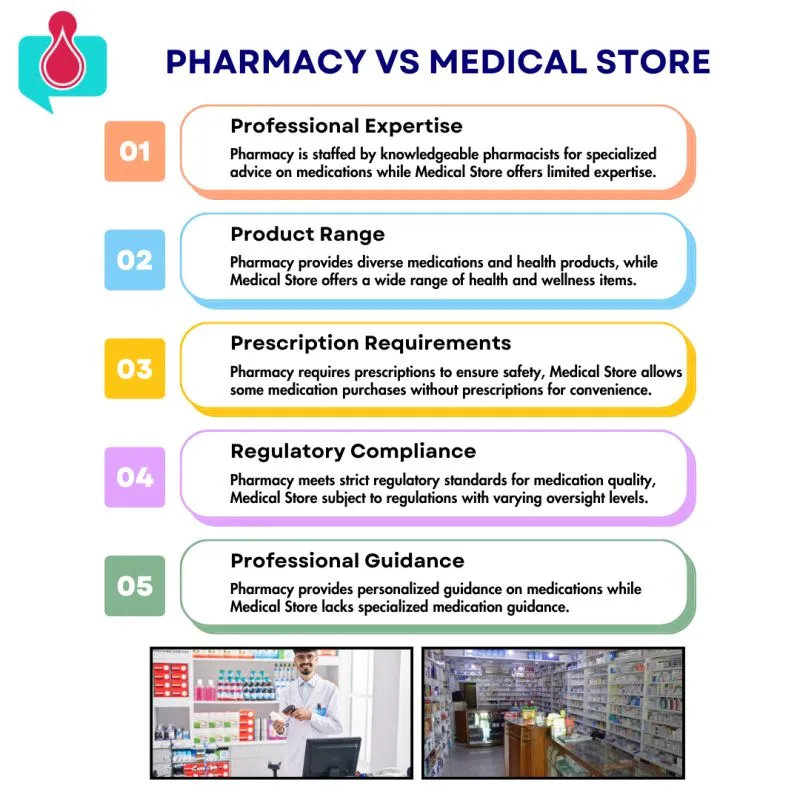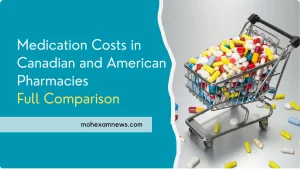Medical Store vs Pharmacy: What Is the Difference?
When it comes to buying medicines, many people believe that medical stores and pharmacies are the same. However, the difference between the two is not just a matter of titles — it directly impacts your health, safety, and well-being. Let’s explore why choosing the right place for your medicines is crucial.
To a layman, the difference is not very noticeable as both stores will provide medicine upon request. But in reality, the difference is huge if we consider patient safety, proper drug handling, and professional guidance.
What is a Medical Store?
It is not more than a shop keeping medicines and providing them to patients upon request. A medical store does not follow the rules & regulations required for medicine handling. Staff is not licensed and often misguide patients with wrong advice which is not safe for patients.
What is a Pharmacy?
Imagine you were prescribed a strong antibiotic. At a pharmacy, the pharmacist would check if the dose is safe based on your age and health condition. At a medical store, you might simply be handed the medicine without any professional advice leading to serious side effects.
A Pharmacy is a proper place where the patient can buy medicines with a doctor’s prescription. This prescription is then rechecked on the criteria of safe dosing by a licensed competent and responsible pharmacist on duty.
Once medicines are prepared it again rechecked by a second pharmacist. You will find medicines are properly stored and temperature monitored. A pharmacist also contacts your doctor if the medicine prescribed is not according to the safety.
| Fun fact: Do you know a pharmacy store in Norway is called Apotek. |
Comparison Chart: Medical Store vs Pharmacy
With a medical store, there are some risks involved which are not faced with Pharmacy. It is important to carefully choose where you obtain your medications to ensure your safety and proper treatment.
This table outlines the key differences to help you make safer choices when buying medicines.
| Quality | Medical Store | Pharmacy |
|---|---|---|
| Professional Expertise | Not available | Strictly followed by ensuring the latest standards |
| Product Range | Health & Wellness items | Medications & health items |
| Prescription Requirement | Not required, prescription medications are sold without a prescription | Required for safe dispensing under the supervision of a pharmacist |
| Regulatory Compliance | Not met | Strictly followed by ensuring the latest standards |
| Professional Guidance | Not available | Licensed pharmacist available to guide on medications |
| Store of Medicines | No surety | Required for safe dispensing under the supervision of a pharmacist |
| Main Motive | Sales & Profits | Healthy safety with safe dispensing of medicines |
| Medication safety | Not ensured | Ensured |
| Health regulations | Not followed | Followed |
| Responsible Medication Use | No Guidance | Professional medication dispensing |
How a Pharmacy is regulated?
In every country, the Ministry of Health is the main body to regulate a pharmacy according to safe medication practices. The ministry also provides licensed pharmacy benefits to ensure proper guidelines & safe practices are followed by pharmacies and pharmacists.
This is the main reason why when you visit a pharmacy you will easily spot the following:
- Pharmacist’s Name
- Pharmacist’s Registration Certificate
- Pharmacy working hours with the pharmacist’s hours of attendance
When choosing a pharmacy, it’s a good idea to talk to the pharmacist. Pharmacists don’t just dispense medicines they ensure drug interactions are avoided, adjust doses when needed, educate patients on correct usage, and alert doctors in case of prescription errors.
Studies have shown that pharmacist interventions can significantly reduce medication errors and improve patient outcomes.
What you should check before buying a medicine?
As a Pharmacist, we recommend you check the following things while buying medicine. A Pharmacist also guides you about safe medicine buying practices.
- Active Ingredients
- Dosage Instructions
- Expiration Date
- Storage (Refrigeration Requirements)
- Prescription Requirement
- Possible Side Effects
- Warnings and Precautions
- Allergies
- Batch Number
- Manufacturer Information
- Packaging Integrity
Medical Store vs. Pharmacy: Understanding the Differences
The below infographic helps us to learn the key differences between medical stores and pharmacies so that safe and effective medication use is practised.

Final thoughts about the Difference between Medical Stores and Pharmacy
To summarize it is easy to understand a medical store is an unprofessional, unsafe and old way to sell and buy medicines.
Always choose licensed pharmacies for your medicines. Your health is your most valuable asset and it deserves professional care. Next time you need a medicine, make the safer choice!






